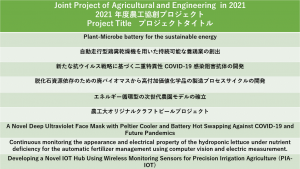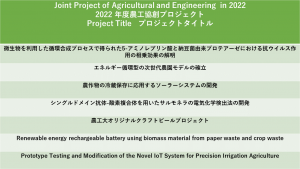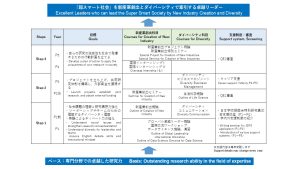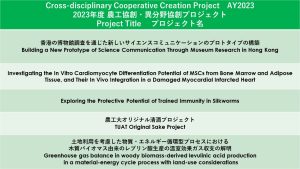In this program, subjects, projects, and support are set up in three phases to acquire “bold conceptualization for the future and steady step-by-step implementation”.
Phase 1: P1 to the first half of P2
1. To understand what is important but not yet understood in current science, and to acquire the ability to conceptualize research that will have a significant impact on a wide range of fields by unraveling these issues.
→ Outline of Creation of New Industries, etc.
2. To understand the necessary diversity for leadership and team building.
→ Diversity communication, etc.
3 Debate skills in English: To acquire the ability to appeal research to the world and to conduct joint research with people overseas.
→ International exchange workshops etc.
Phase 2: Second half of P2 – P3
4. Set up projects, establish joint research systems, and obtain external funding
→ Seminar for Creation of New Industry, Diversity Business Management, etc.
Phase 3: P4-P5
5. Develop an action plan to demonstrate the originality of one’s own research in society.
→ Special Project for Creation of New Industry, etc.
To complete this program, students select and complete courses offered by WISE Program and pass the Qualifying Examination (QE), in addition to the completion of student’s major. The minimum number of credits in WISE Program for “regular students” who participate from the master’s program is 10 credits: 8 credits in the first 2 years and 2 credits in the following 3 years. “Transferred students” who participate from the first year of the doctoral program are required to take 6 credits over the 3 years. QE1 is conducted at the end of the second year of the Master’s program, and QE2 is conducted at the end of the third year of the Doctoral program.
Financial Support for Students
・ Financial Support
The WISE program provides financial support information.
Many students in the doctoral program have received scholarships from within TUAT, such as the Institute for Fostering Leadership to create future value through Outstanding Research, Innovation and Sustainable Higher education (FLOuRISH), as well as scholarships from outside TUAT.
Support may vary from year to year.
・ Financial Support Programs
For example, the following programs are available, and we encourage you to take advantage of them.
– TUAT Encouragement Grant for Research Internship at Overseas Institution (support for 4th year undergraduate students and pre-doctoral students)
– TUAT – Overseas Study Abroad Program for Doctoral Students (for 4th year undergraduates and early doctoral students)
– IAESTE International Internship
・Cross-disciplinary Cooperative Creation Project (former Joint Project of Agricultural and Engineering) until FY2024
The program has provided financial support for projects in which students themselves engage in “collaboration of agriculture and engineering” which is one of the themes of the WISE program, and collaborative creation with other fields, after screening.
Research themes supported by the Joint Project of Agricultural and Engineering Project expenses in FY2021

Research themes supported by the Joint Project of Agricultural and Engineering Project expenses in FY2022

Research themes supported by the Cross-disciplinary Cooperative Creation Project in FY2023
Research themes supported by the Cross-disciplinary Cooperative Creation Project in FY2024




